|
|
|
Sort Order |
|
|
|
Items / Page
|
|
|
|
|
|
|
| Srl | Item |
| 1 |
ID:
118003
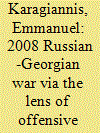

|
|
|
|
|
| Publication |
2013.
|
| Summary/Abstract |
The Russian intervention in Georgia's breakaway republic of South Ossetia in August 2008, Moscow's first-ever use of military force against a sovereign state in the post-cold war period, deserves a theoretical explanation. By following the tenets of Offensive Realism, this article will argue that the US-Russian competition in the South Caucasus is the main cause of the 2008 Russian-Georgian war. During the 1990s, the USA passed the buck to Turkey to contain Russian influence in the South Caucasus. In the early to mid-2000s, however, the Russian-Turkish relations were improved so rapidly that the USA opted, through NATO expansion, to step in as an offshore balancer. Following Bush administration's decision to support the Georgian candidacy for NATO membership and Georgia's ill-fated attempt to seize South Ossetia, Moscow went to war to re-establish hegemony in the South Caucasus. In this way, as the theory of Offensive Realism claims, the Kremlin believes that Russian state will enhance its chances of survival in the anarchical international system.
|
|
|
|
|
|
|
|
|
|
|
|
|
|
|
|
| 2 |
ID:
113729
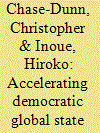

|
|
|
|
|
| Publication |
2012.
|
| Summary/Abstract |
This article discusses the evolution of the international system and global governance within the Europe-centred modern world-system since the 15th century in the context of a comparative framework that includes interpolity systems since the Stone Age. The evolution of the modern system includes the emergence of the European system of sovereign national states and colonial empires, the extension of the Westphalian system to the non-core by succeeding waves of decolonization, the rise and fall of successively larger hegemons, the deepening of global capitalism in waves of globalization, the emergence of weak international regulatory institutions and the prospects for and the rapid emergence of global democracy. It is not claimed that a global state has already emerged, but the authors see the long-term processes as the early stages of the emergence of a world state, and consider how these processes might be accelerated within the next few decades. The need for democratization of the institutions of global governance is also discussed. However, in this article, the focus is more on real geo-historical processes than normative questions, outlining the evolution of interpolity institutional orders, describing the challenges in thinking about global state formation, and discussing some of the technological and political forces that might accelerate the long-term trend toward global state formation.
|
|
|
|
|
|
|
|
|
|
|
|
|
|
|
|
| 3 |
ID:
173911
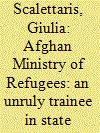

|
|
|
|
|
| Summary/Abstract |
This article looks at the interactions between the officials of the United Nations High Commissioner for Refugees (UNHCR)’s mission in Afghanistan and the heads of the Afghan Ministry of Refugees in the mid-2000s. It examines the rationales that guide officials at both the UNHCR and the ministry, as a way of unpacking the politics of state capacity building in post-2001 Afghanistan. The first section looks at the tense relationship between the two bodies from the point of view of UN officials, who strive to redress a ministry portrayed as ‘incapable’. By looking in turn at the fundaments of the political legitimacy of the Afghan state, at how international intervention transforms the Afghan political arena, and at Afghanistan’s position in global power relations, the following sections identify three rationales that can be ascribed to ministry officials, namely reconciling internal and external state legitimacy, strategic resource tapping and resistance to inter-state hegemony. From its standpoint at the juncture between an ‘external’ and a ‘local’ institution, the article ultimately stresses the importance of gaining epistemological distance from the peace building project in order to consider ‘local’ actors as full political actors.
|
|
|
|
|
|
|
|
|
|
|
|
|
|
|
|
| 4 |
ID:
163692
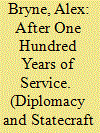

|
|
|
|
|
| Summary/Abstract |
In 1923, the United States celebrated the centennial anniversary of the Monroe Doctrine. Overlooked by historians, the centennial served as more than an isolated moment of memorialisation; this analysis investigates the ways in which it shaped and reflected domestic perceptions of the place of the United States in the world during the early 1920s. The various celebratory events that took place across the nation re-enforced the discordant nature of United States national security by emphasising and exacerbating the doctrine’s disputed meaning. By providing a forum in which it could be scrutinised, the centennial emphasised the policy’s fractured meaning and demonstrated that both regional hegemony in the Western Hemisphere and Pan-Americanism were perceived as core values of United States national security that emanated from the doctrine’s enunciation in 1823.
|
|
|
|
|
|
|
|
|
|
|
|
|
|
|
|
| 5 |
ID:
105977
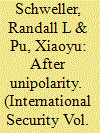

|
|
|
|
|
| Publication |
2011.
|
| Summary/Abstract |
The emerging transition from unipolarity to a more multipolar distribution of global power presents a unique and unappreciated problem that largely explains why, contrary to the expectations of balance of power theory, a counterbalancing reaction to U.S. primacy has not yet taken place. The problem is that, under unipolarity and only unipolarity, balancing is a revisionist, not a status quo, behavior: its purpose is to replace the existing unbalanced unipolar structure with a balance of power system. Thus, any state that seeks to restore a global balance of power will be labeled a revisionist aggressor. To overcome this ideational hurdle to balancing behavior, a rising power must delegitimize the unipole's global authority and order through discursive and cost-imposing practices of resistance that pave the way for the next phase of full-fledged balancing and global contestation. The type of international order that emerges on the other side of the transition out of unipolarity depends on whether the emerging powers assume the role of supporters, spoilers, or shirkers. As the most viable peer competitor to U.S. power, China will play an especially important role in determining the future shape of international politics. At this relatively early stage in its development, however, China does not yet have a fixed blueprint for a new world order. Instead, competing Chinese visions of order map on to various delegitimation strategies and scenarios about how the transition from unipolarity to a restored global balance of power will develop.
|
|
|
|
|
|
|
|
|
|
|
|
|
|
|
|
| 6 |
ID:
085932
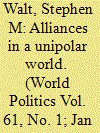

|
|
|
|
|
| Publication |
2009.
|
| Summary/Abstract |
An alliance (or alignment) is a formal (or informal) commitment for security cooperation between two or more states, intended to augment each member's power, security, and/or influence.
|
|
|
|
|
|
|
|
|
|
|
|
|
|
|
|
| 7 |
ID:
052469
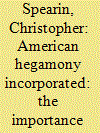

|
|
|
|
|
| Publication |
Dec 2003.
|
| Summary/Abstract |
The article contends that private military contractors supporting American military operations in Iraq will come under intense international scrutiny. Various factors have led to the substantial private presence and the Iraq case reveals shifts in international dynamics from state to private actors. However, the private presence raises concerns that will have to be considered due to the fishbowl qualities of the Iraq case. How the state-contractor relationship is managed will likely have a significant impact upon American policy in Iraq and upon how American military might is perceived, produced, and applied in the future.
Indeed, there are many problems and it is not entirely clear that the United States is prepared to handle the effects stemming from its heavy reliance upon military contractors.
|
|
|
|
|
|
|
|
|
|
|
|
|
|
|
|
| 8 |
ID:
057957
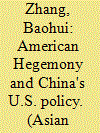

|
|
|
| 9 |
ID:
053166
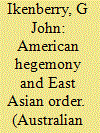

|
|
|
| 10 |
ID:
075093
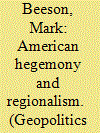

|
|
|
| 11 |
ID:
067054
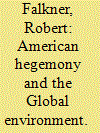

|
|
|
| 12 |
ID:
121197
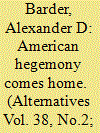

|
|
|
|
|
| Publication |
2013.
|
| Summary/Abstract |
International theorists have long argued over the longevity of American hegemony and whether or not the American-centered international order is currently in crisis. What remains largely missing in many of the analyses of the history and present of American hegemony is an examination of how maintaining global hegemony affects or has affected domestic American political and economic institutions. Looking back at the early 1970s, I examine the nexus between the crisis of American global hegemony in the aftermath of the Vietnam War, the project of neoliberalization in Chile and how the Chilean socioeconomic "laboratory" set an important precedent for the subsequent adoption of neoliberal reforms in the United States under the Reagan Administration. The reassertion of American hegemony was coextensive with a neoliberal project that was initially experimented with in Chile under the authoritarian rule of Augusto Pinochet.
|
|
|
|
|
|
|
|
|
|
|
|
|
|
|
|
| 13 |
ID:
067051
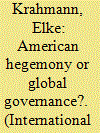

|
|
|
| 14 |
ID:
065621
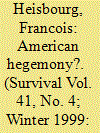

|
|
|
| 15 |
ID:
125905
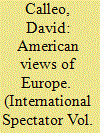

|
|
|
|
|
| Publication |
2013.
|
| Summary/Abstract |
America's diplomacy towards Europe has passed through two broad historic phases. A first, isolationist phase, determined in part by America's need to maintain its domestic multinational consensus, was replaced, after World War II and under the Soviet threat, by a policy of hegemonic engagement. The Soviet collapse opened a new era forcing a reinterpretation of America's role in Europe and the world. Four different narratives have emerged: triumphalist, declinist, chaotic or pluralist. If a unipolar American role seems unlikely to persist, American decline is all too possible. A new hegemonic replacement seems unlikely, which makes the pluralist narrative plausible and desirable. This multipolar world will require an adaptation of the Western alliance and a new way of thinking about interstate relations. Confederal Europe, for its experience in bargaining and conciliation, might have much to offer to the new plural world order.
|
|
|
|
|
|
|
|
|
|
|
|
|
|
|
|
| 16 |
ID:
165317
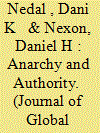

|
|
|
|
|
| Summary/Abstract |
Do international systems tend to remain anarchic because of recurring balances of power, or do they tend toward imbalances and hierarchy? Leading structural theories posit competing predictions about systemic outcomes, and the historical record offers evidence to support both claims. This suggests the need to theorize conditions under which one tendency or another is likely to dominate and what factors lead systems to transition from one state to another. We draw on constructivist and English School insights about international authority and legitimacy to develop such a framework. We conceive of patterns of international authority as structures independent from, and interacting with, mechanisms usually associated with international anarchy, such as the balance of power. We propose that international authority systems vary along two dimensions: particularist cosmopolitan and substitutable nonsubstitutable. Both are emergent properties of ideas and institutions located at the unit level. We argue that certain authority systems—particularist and nonsubstitutable—reinforce, and are reinforced by, anarchy and balanced distributions of capabilities. Others—cosmopolitan substitutable—facilitate rollup and domination and are likely to emerge or be maintained in hierarchic and highly asymmetric systems. By offering a structural account of international authority, we hope to contribute to the global turn in international relations, offering a framework for comparing systems across time and space. We also aim to help make sense of contemporary struggles over norms and values, their structural causes and consequences, and their potential implications for the future of global power politics.
|
|
|
|
|
|
|
|
|
|
|
|
|
|
|
|
| 17 |
ID:
084670
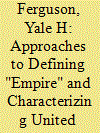

|
|
|
|
|
| Publication |
2008.
|
| Summary/Abstract |
The militant unilateralism of the George W. Bush administration has revived interest in such closely related and contested terms as "superpower,""hegemon,""empire," and "imperialism." This article identifies four different but somewhat overlapping approaches to defining "empire": ideal type, self-consciously empirical, constructivist, and overtly normative. The author's personal view is that any notion of American Empire or indeed U.S. hegemony or even superpower is profoundly misleading. Although the United States still ranks high on the scale of most traditional realist power factors, United States capabilities appear to be gravely waning today and its exercise of both hard and soft power has recently been so inept as to limit its current influence and possibly future role in global politics.
|
|
|
|
|
|
|
|
|
|
|
|
|
|
|
|
| 18 |
ID:
107103


|
|
|
|
|
| Publication |
2011.
|
| Summary/Abstract |
THE DECEMBER 2010 ISSUE of Negocies Estrangeiros, official biannual of the Portugal Diplomatic Institute at the Foreign Ministry of Portugal, carried a detailed analytical forecast by Joao Fabio Bertonha, professor of history at the State University of Maring (Brazil). The journal deals mainly with topical issues of Portugal's foreign policy, foreign economic activities and historical and cultural contacts with the rest of the world. It appears in Portuguese with some of the materials published in English.
Issue 18 deals with a selection of articles on various subjects and in different genres contributed by Portuguese and foreign authors; information materials coexist here with fundamental analytical studies, a veritable feast for inquisitive minds.
|
|
|
|
|
|
|
|
|
|
|
|
|
|
|
|
| 19 |
ID:
151213
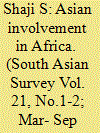

|
|
|
| 20 |
ID:
121860
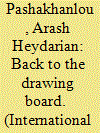

|
|
|
|
|
| Publication |
2013.
|
| Summary/Abstract |
Offensive realism argues that states committed to survive are nevertheless condemned to participate in a relentless struggle for power, and it holds the structure of the international system as the cause of this tragic outcome. This article subjects the logic behind this tragic worldview and the explanatory power of offensive realism to a careful and comprehensive scrutiny. This in-depth analysis of offensive realism amounts to a substantial critique of the theory as it fails to logically generate the brutish world it presupposes and is plagued by significant shortcomings in its explanatory model. These findings suggest that offensive realism cannot provide useful theoretical lenses for explaining and understanding international politics, even when it is assessed on its own terms.
|
|
|
|
|
|
|
|
|
|
|
|
|
|
|
|
|
|
|
|
|